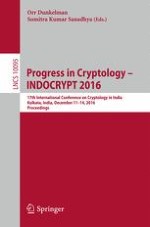2016 | OriginalPaper | Chapter
Revocable Decentralized Multi-Authority Functional Encryption
Authors : Hikaru Tsuchida, Takashi Nishide, Eiji Okamoto, Kwangjo Kim
Published in: Progress in Cryptology – INDOCRYPT 2016
Publisher: Springer International Publishing
Activate our intelligent search to find suitable subject content or patents.
Select sections of text to find matching patents with Artificial Intelligence. powered by
Select sections of text to find additional relevant content using AI-assisted search. powered by
